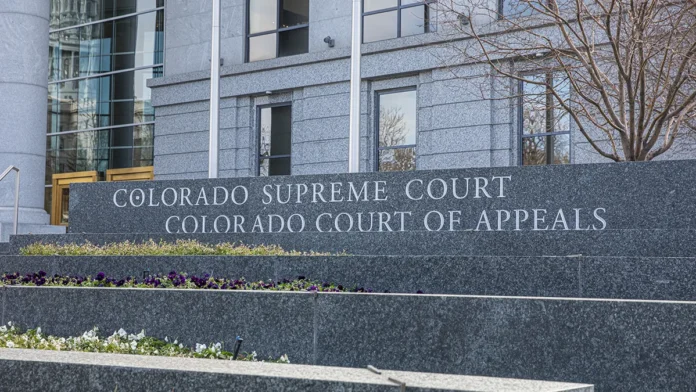
Case Summary
- Colorado’s highest court narrowly upheld the disbarment of former prosecutor Linda Stanley in a 4-2 split that exposed deep divisions over judicial ethics
- Two dissenting justices called the majority’s tolerance of a conflicted judge’s partial recusal “troubling” and “inappropriate”
- Stanley loses her law license but wins a procedural point that could signal broader problems with Colorado’s disciplinary system
By Samuel Lopez · USA Herald
DENVER — The Colorado Supreme Court handed down a fractured decision Monday, voting 4-2 to uphold the disbarment of former 11th Judicial District Attorney Linda Stanley, even as two justices warned the entire proceeding was tainted by a disciplinary judge’s refusal to fully recuse himself. The decision affirms a disciplinary board’s split ruling, but it does so while walking straight into the minefield of judicial impartiality — a principle that should be sacred in every courthouse across America.
At the center of this legal brawl is Judge Bryon M. Large, who presided over Stanley’s disciplinary hearing. Years earlier, while serving as assistant regulation counsel for the Office of Attorney Regulation Counsel, Large personally investigated Stanley in an unrelated matter and issued a public censure against her. That prior history made his role in her disbarment proceedings controversial from the outset. Stanley argued that he should have stepped aside completely. Large instead recused himself only from the portion of the case involving how much weight to give her earlier censure.
The majority, led by Justice William W. Hood III, admitted it was a “close call” but concluded there wasn’t enough evidence to force Large off the entire case. They insisted the other two board members had sole discretion over whether to treat Stanley’s prior sanction as an aggravating factor.
“While we agree with Stanley’s argument on appeal that the board’s consideration of her prior public censure as an aggravating factor in her sanction in this case created a material relationship between the two proceedings … [Judge Large] abstained from that part of the board’s sanction,” Hood wrote.
But let’s be real. A judge presiding over a lawyer’s professional death sentence when he himself had once prosecuted her for misconduct? Even if he sincerely believed he could be impartial, the optics alone reek of impropriety. Justice must not only be done; it must be seen to be done. The dissenters — Chief Justice Monica M. Marquez and Justice Carlos A. Samour Jr. — recognized exactly that danger.
“The majority’s conclusion that [Judge Large’s] decision to remain on the case is nevertheless acceptable is troubling,” Samour wrote. The dissent made it plain: Stanley was legally entitled to an impartial three-member tribunal. Anything less erodes the legitimacy of the entire process. “By law, Stanley was entitled to have a board made up of three members consider her entire case — not most of her case or even ninety-nine percent of her case,”Samour emphasized. To allow a makeshift partial recusal, he argued, “overlooks the appearance of impropriety that [Judge Large’s] makeshift procedure engendered.”
I couldn’t agree more.
This wasn’t just a fight over technicalities. Stanley’s professional future was on the line. She faced accusations ranging from abusing her authority as DA to pursuing an investigation into a judge regarding “unfounded rumors” of domestic abuse against his ex-wife. The judge in question was presiding over a high-profile murder case Stanley’s district was prosecuting.
The disciplinary board concluded that Stanley trampled defendants’ rights, jeopardized victims’ access to justice, and compromised public trust. Those findings carried devastating consequences: permanent disbarment.
Even so, the dissent reminded us of a fundamental truth: due process applies even to those accused of serious failings. “Regardless of the egregious nature of the allegations brought against her, before her livelihood as an attorney in this state is permanently taken away, she’s entitled to a proceeding conducted in front of a tribunal whose impartiality and fairness cannot reasonably be doubted,” Samour wrote. That’s not sympathy for Stanley — that’s the rule of law.
Stanley did secure one narrow reprieve. The high court reversed a single violation tied to her handling of the Barry Morphew murder prosecution, finding she had not committed an ethical breach by failing to supervise her trial team more aggressively. The justices noted she was inexperienced with high-profile felonies and that her team should have been able to manage the daily complexities. Still, her dismissal of the Morphew case in 2022, after discovery issues surfaced, remains a black mark in the public eye. Morphew has since been rearrested and now faces first-degree murder charges anew.
Stanley’s lawyer, Steven L. Jensen, seized on the mixed result, saying in a statement that they agreed with the court’s recognition she committed no misconduct in the Morphew case and aligned with the dissent that Judge Large should have been fully disqualified. The state, represented by Erin Robson Kristofco and Jonathan Blasewitz, successfully pressed for her disbarment to remain intact.
The case, In the Matter of Attorney-Respondent Linda Stanley, No. 24SA263, leaves Colorado lawyers and the public with an uncomfortable question. If a judge with clear prior history against a respondent can sit in judgment — even partially — what confidence should litigants have in the neutrality of disciplinary boards?


